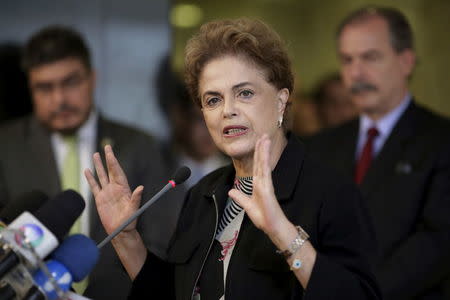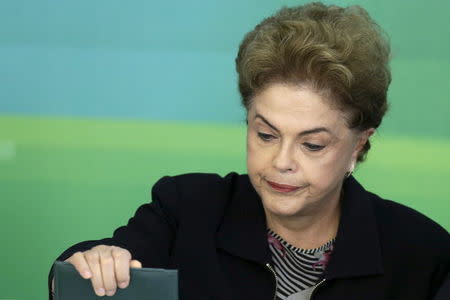Brazil's Rousseff says not resigning in political crisis
By Anthony Boadle BRASILIA (Reuters) - Brazil's President Dilma Rousseff rejected calls for her resignation on Friday amidst a political storm deepened by a massive corruption scandal and blamed her opponents for causing a crisis that has hurt the Brazilian economy. "No one has the right to ask for the resignation of a legitimately elected president without showing proof that I violated the Constitution to warrant my impeachment," Rousseff told reporters, indicating she has no intention of quitting despite Brazil's worst economic recession in 25 years. The leftist leader, who was narrowly re-elected in 2014, is losing ground among her coalition allies and faces nationwide demonstrations Sunday organized by opposition parties seeking to rally support for impeaching the president in Congress. Rousseff said calls for her resignation were damaging the Brazilian economy, which shrank 3.8 percent last year. "This wave of rumors is creating a political crisis that is absolutely negative for the economy," she said. Brazil's currency, however, strengthened ahead of Sunday's pro-impeachment protests, ending a third week of gains as investors bet on a change of government ushering in more business-friendly policies to restore confidence and growth. The real climbed 4.5 percent against the dollar for the week and ended at 3.59 to the dollar, its strongest close since August. Opposition parties are seeking to unseat Rousseff by impeachment in Congress or annulment of her re-election for allegedly using illegal money from the Petrobras bribery and kickback scandal to fund her campaign. Charges of money laundering brought against her mentor and predecessor former president Luiz Inacio Lula da Silva have deepened the crisis this week. Rousseff said an arrest warrant requested by Sao Paulo state prosecutors for Lula on Thursday had absolutely no legal basis. She declined to confirm press reports that Lula would be offered a post in her cabinet as a way to give him some immunity from the corruption investigation, but she said she would be proud to have him in her government. The widening corruption probe surrounding state-run oil company Petrobras has turned key lawmakers from Brazil's largest party against Rousseff, threatening to split her coalition and increasing chances of her impeachment in Congress this year. The Brazilian Democratic Movement Party, known as the PMDB, is the main ally of the ruling Workers' Party and its leader, Michel Temer, is Rousseff's vice president. The party is expected to avoid an outright break with Rousseff's government at a biennial convention on Saturday, but it could decide to free its lawmakers to vote for Rousseff's impeachment, which would put Temer in the presidential seat. The advance of the corruption probe toward the inner circle of the Rousseff government and the prospect of mass protests led the Eurasia risk-analysis firm to raise the odds of her ouster from office to 65 percent from 55 percent. (Reporting by Anthony Boadle; Editing by Meredith Mazzilli and Mary Milliken)




